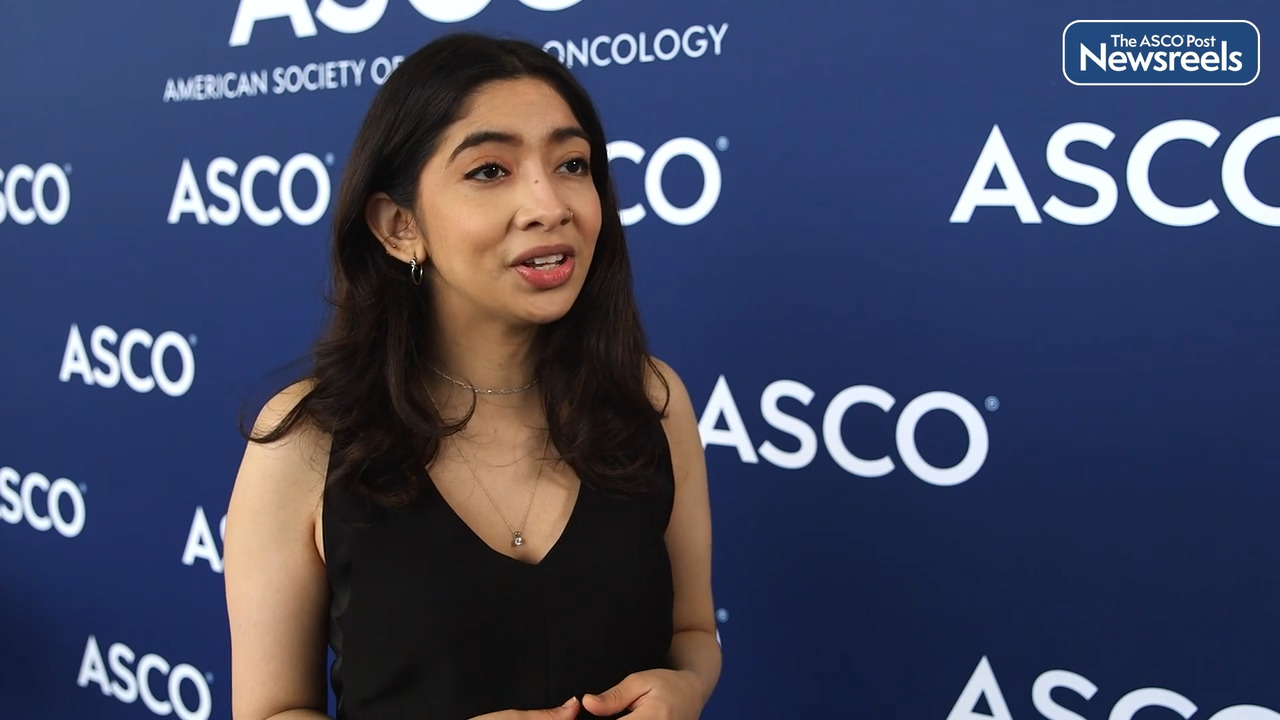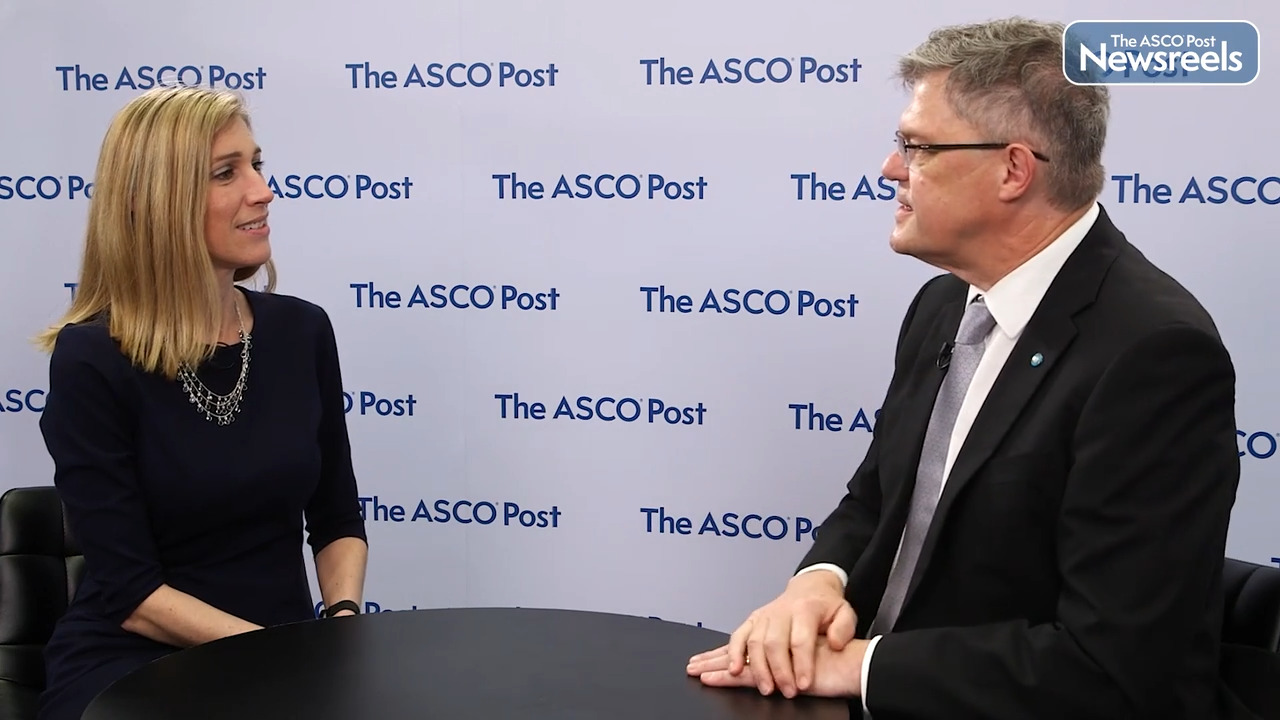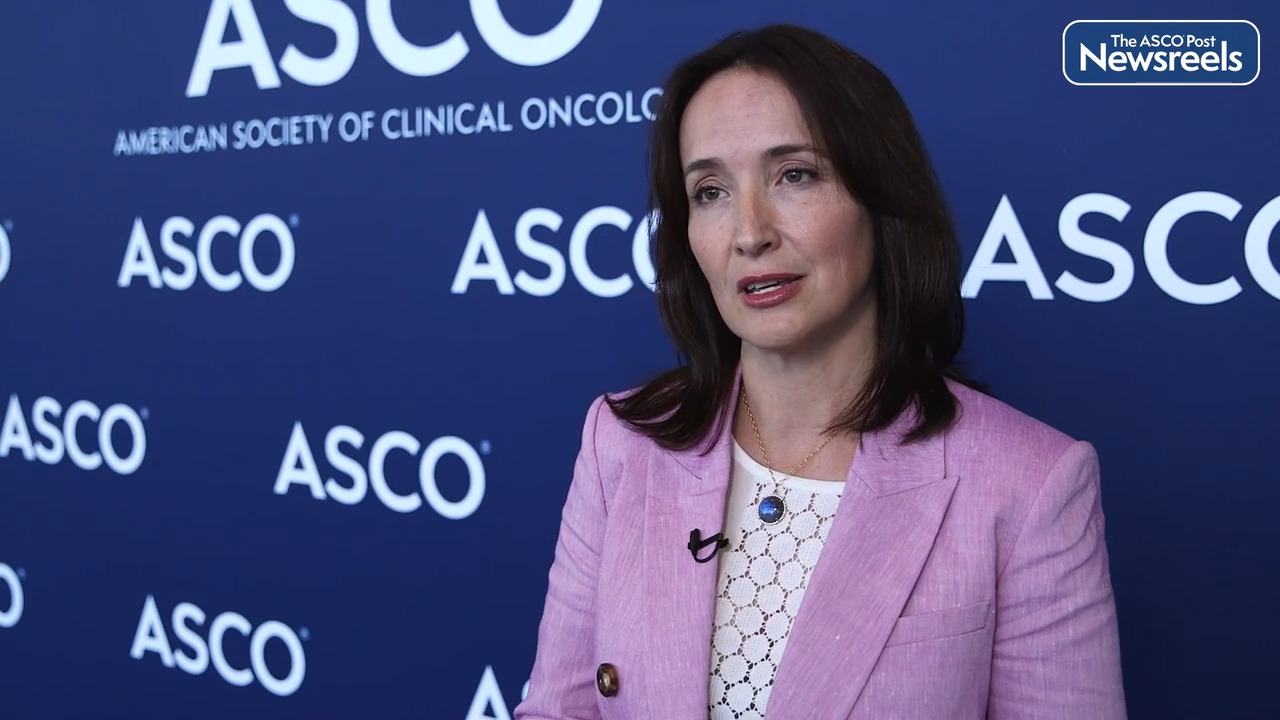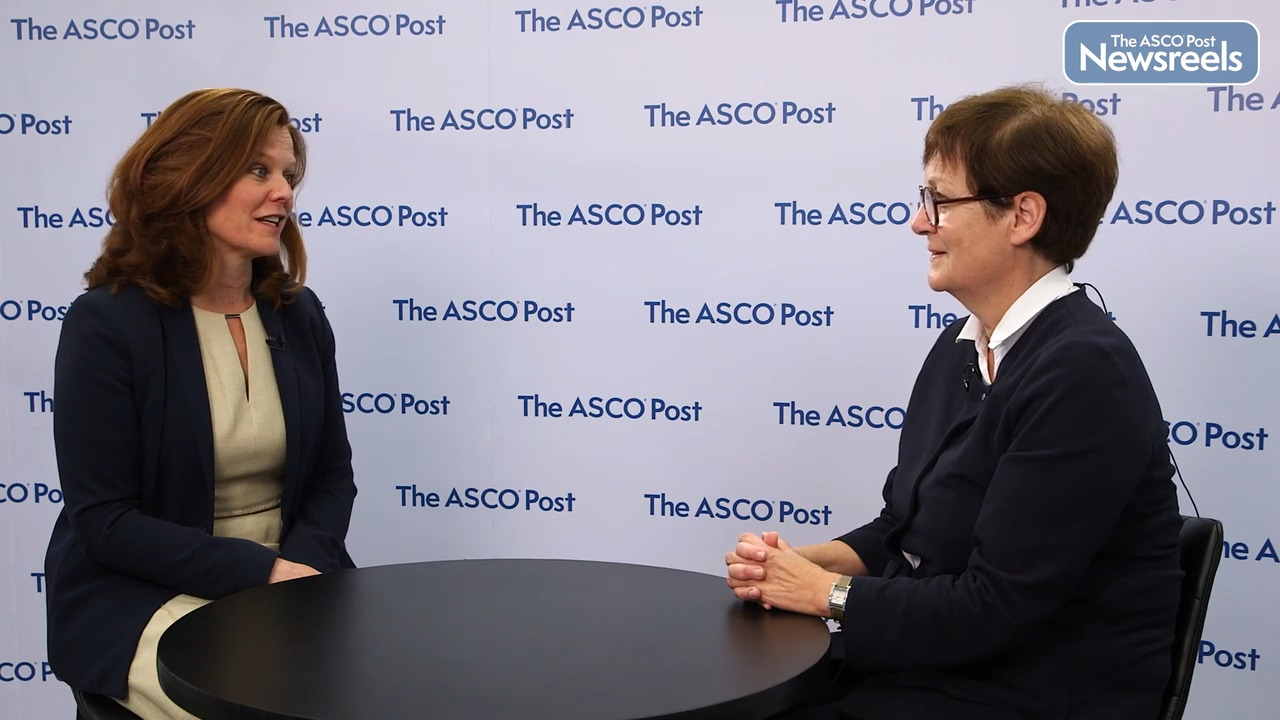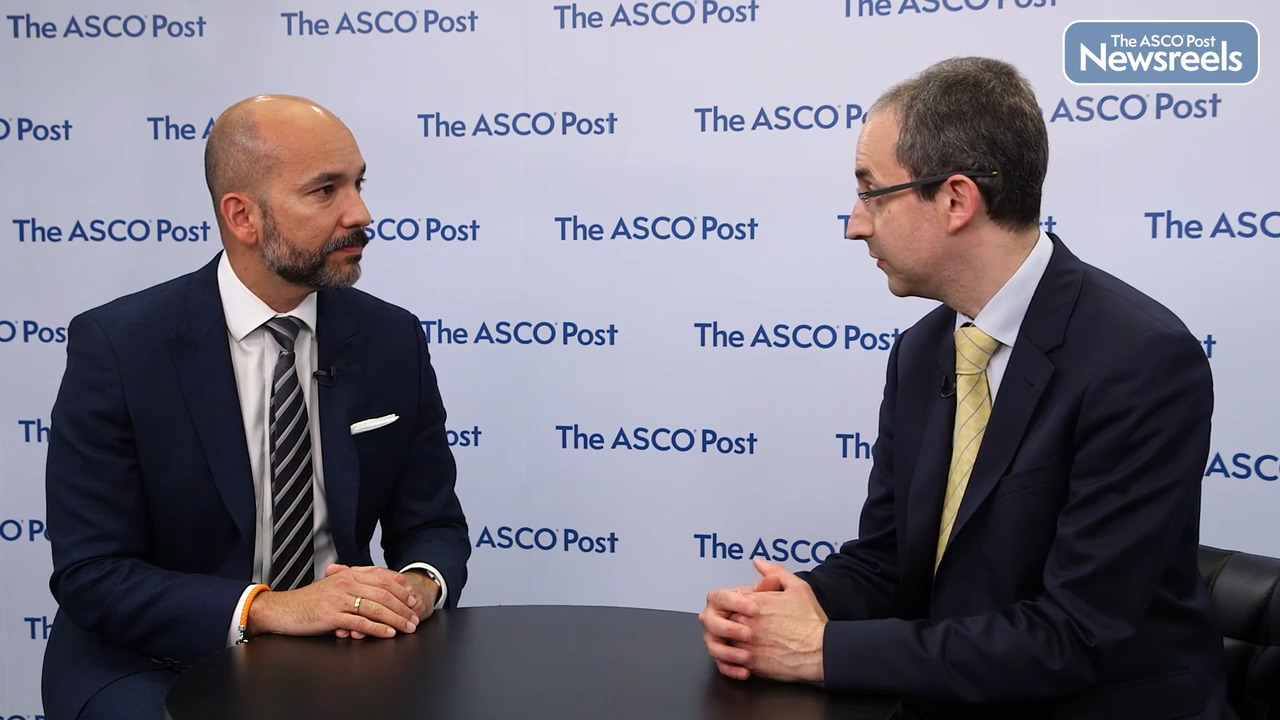Carryn M. Anderson, MD, on Head and Neck Cancer: New Data on Avasopasem Manganese for Oral Mucositis
2022 ASCO Annual Meeting
Carryn M. Anderson, MD, of the University of Iowa Hospital, discusses phase III results of the ROMAN trial of avasopasem manganese for patients with severe oral mucositis who are receiving chemoradiotherapy for locally advanced, nonmetastatic head and neck cancer. Compared with placebo, avasopasem manganese improved severe oral mucositis (Abstract 6005).
Transcript
Disclaimer: This video transcript has not been proofread or edited and may contain errors.
So I'm excited today to report on the results of the ROMAN trial, which is a phase three randomized trial investigating the role of avasopasem manganese in decreasing severe oral mucositis in head and neck cancer patients receiving concurrent IMRT and cisplatin. So let's talk a little bit about background as to why this clinical trial is so important. Our patients who are receiving concurrent IMRT and cisplatin very commonly suffer from the awful side effect of oral mucositis. It causes severe pain in our patients. They often need high doses of narcotics. They may end up being hospitalized because of the severity of the condition and may end up with treatment breaks and also commonly need feeding tube. The oral mucositis grading system that is utilized in the ROMAN trial is the WHO grading system, and this uses a combined physical exam finding of oral mucositis ulcers in the mouth as well as the impact of those ulcers on a patient's diet. So severe oral mucositis is defined as grade three and four, with three meaning that the ulcers are so bad that patients can no longer take solid diet by mouth and are on liquids only, whereas grade four mucositis means they are now feeding tube dependent. We do not have any FDA approved drugs to mitigate this severe side effect. So enter avasopasem manganese. This is an enzyme that rapidly converts radiation-induced superoxide to hydrogen peroxide. And that is important because superoxide is what causes the downstream cascade of events that results in the development of oral mucositis. Now it has been shown in several basic science experiments as well as, now, several clinical trials that the mechanism of this drug does not spare tumor cells from the damaging effects of radiation, but it does mitigate the side effects to normal cells. So this drug has been tested in a randomized phase two placebo-controlled trial, with two doses of the drug compared against placebo. And it's statistically significantly reduced the duration of severe oral mucositis and the incidence, as well as the severity. Importantly, one- and two-year outcomes were maintained, and the drug did not impact tumor control. So the higher dose of the drug, which was more effective in mitigating severe oral mucositis, was brought forth for phase three testing, and that is what we are reporting today. The ROMAN trial included oral cavity and oral pharynx patients who were receiving IMRT with concurrent cisplatin. The drug was given as a 60-minute IV infusion prior to each radiation fraction, ending 60 minutes prior to the administration of the radiation. Patients were stratified by their surgical status and cisplatin dose schedule, and 455 patients were enrolled. The data presented today is on the intention to treat analysis patients of 407 patients. And importantly, the primary endpoint was met. Ava decreased statistically significantly and clinically meaningfully the incidence of severe oral mucositis at the end of IMRT from 64% down to 54% at a P value of 0.045. Also very importantly, the secondary endpoint of duration of severe oral mucositis, which is a very clinically relevant endpoint, was statistically and impressively reduced by 56% from 18 days on the placebo arm down to only eight days in the Ava arm. The incidence of grade four oral mucositis and the duration of grade four mucositis was also nominally reduced but did not quite meet statistical significance. And this drug did delay the onset of severe oral mucositis from 38 days in the placebo arm to 49 days in the Ava arm. The safety profile of this drug was excellent. Patients experienced the side effects already expected for radiation with concurrent cisplatin. There was a slight increase in nausea and vomiting grade one, mild and limited, in the Ava arm. This is a known side effect of this medicine, but that did not translate to an increase in grade three nausea or vomiting. So we're excited to present today that this is a positive trial. The primary endpoint of severe oral mucositis incidents was statistically and clinically meaningfully reduced. The duration of severe oral mucositis was also statistically significantly and clinically meaningfully reduced in this patient population. We did see nominal decreases in grade four mucositis and a delay in onset of severe oral mucositis. We are excited to follow the tumor outcomes on these patients to report on those at one and two years. The drug is being offered to the FDA by the company, and we hope to hear more about that later this year. And we're also exploring some other endpoints, for example, impact on healthcare utilization and impact of the drug on things like cisplatin-induced kidney injury.
Related Videos
The ASCO Post Staff
Jenny S. Guadamuz, PhD, of Flatiron Health, discusses the use of telemedicine services in community oncology clinics for patients initiating treatments for 21 common cancers during the COVID-19 pandemic. Black, uninsured, non-urban, and less affluent patients were less likely to use telemedicine services. Although telemedicine may expand access to specialty care, the proliferation of these services may widen cancer care disparities if equitable access to these services is not ensured, according to Dr. Guadamuz (Abstract 6511).
The ASCO Post Staff
Alicia K. Morgans, MD, MPH, of Dana-Farber Cancer Institute, and Ian D. Davis, PhD, MBBS, of Monash University and Eastern Health, discuss the latest findings from ANZUP Cancer Trials Group’s ENZAMET cooperative group trial of enzalutamide in patients with metastatic hormone-sensitive prostate cancer. The results corroborate the benefit of enzalutamide with improved overall survival, and involve some exploratory subgroup analyses (Abstract LBA5004).
The ASCO Post Staff
Pamela L. Kunz, MD, of the Yale University School of Medicine, discusses new findings from the ECOG-ACRIN E2211 trial, which showed the longest progression-free survival and highest response rates with temozolomide plus capecitabine reported to date for patients with pancreatic neuroendocrine tumors. The presence of a deficiency of MGMT, the drug-resistance gene, was associated with greater odds of an objective response (Abstract 4004).
The ASCO Post Staff
Ann H. Partridge, MD, MPH, of Dana-Farber Cancer Institute, and Véronique Diéras, MD, of the Centre Eugène Marquis, discuss the many challenges posed by next-generation antibody-drug conjugates (ADCs). They include side effects such as hematotoxicity, gastrointestinal toxicities, and interstitial lung disease; tumor targeting and payload release; drug resistance; and the urgent need to understand ADCs’ mechanisms of action to better sequence and combine drugs.
The ASCO Post Staff
Gilberto de Lima Lopes, Jr, MD, MBA, of the Sylvester Comprehensive Cancer Center at the University of Miami, and Matthew Krebs, PhD, of The University of Manchester and The Christie NHS Foundation Trust, discuss results from the CHRYSALIS study. The trial showed that the bispecific antibody amivantamab-vmjw demonstrated antitumor activity, even after prior treatment, in patients with non–small cell lung cancer that exhibits the MET exon 14 skipping mutation (Abstract 9008).
